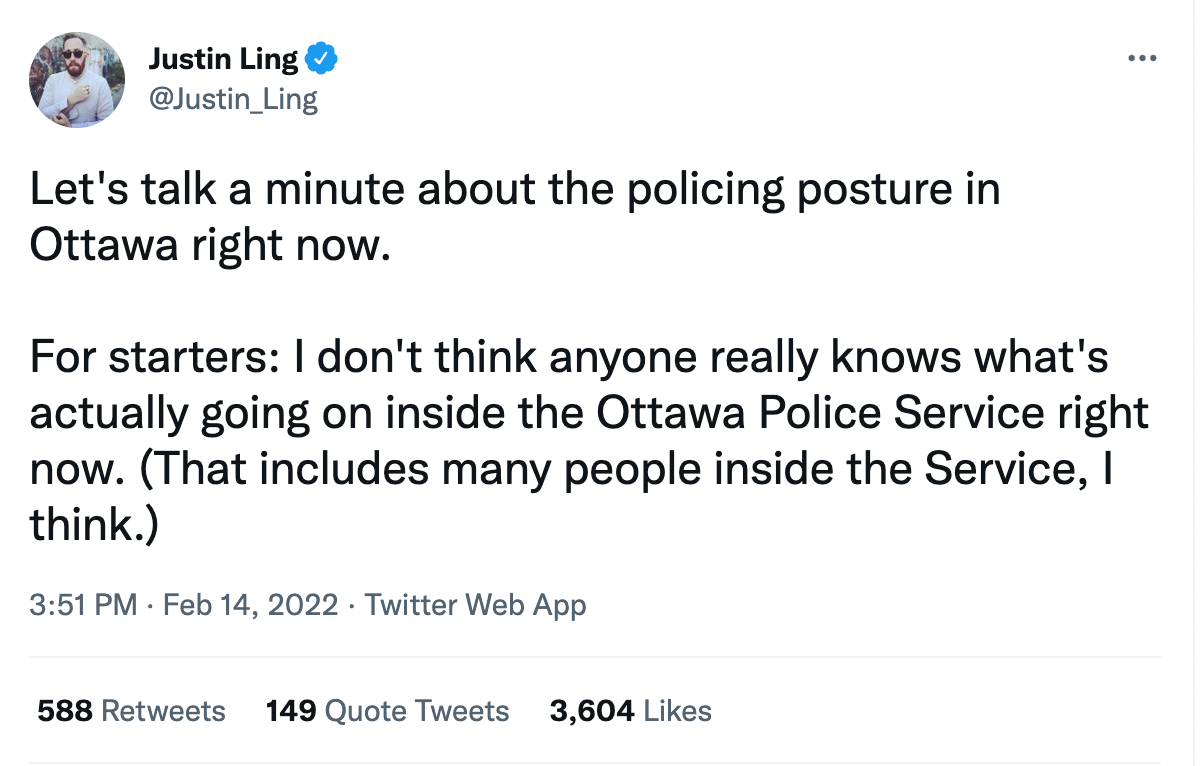Over the next few months, I expect that we’ll see countless analyses and reports about why the occupation of Ottawa in January/February 2022 became such a disaster for the city. But there’s one failure that became apparent to me right away – a failure to communicate by those in charge.
Here’s the thing. We’re hard-wired to make sense of what’s going on around us through the lens of story. Our subconscious is constantly trying to figure out why things are happening – what problem people are trying to solve through their actions.
Why is that guy carrying flowers? Does he have a date? Is he going to a funeral? Is his partner mad at him? Why does my breakfast taste funny? Is the bread mouldy? Was that banana rotten? Did they change the cereal recipe again?
When we don’t have the information we need to answer our questions, we seek out new information. And we speculate. We fill in the blanks as best we can. We make up our own stories about what’s going on. Then, we share those stories with others, through conversations and social media.
The more often we tell and hear these speculative stories, the more deeply embedded they become in our brains, the more we believe them to be true.
So when the world watched hundreds of vehicles and protesters roll into downtown Ottawa and set up blockades while the police, city, province and feds did and said nothing, our Narrative Intelligence went into overdrive trying to figure out what was happening.
Why weren’t the police stopping them? Why weren’t they ticketing the protestors when they were still ticketing citizens in hospital parking lots? Why didn’t the Mayor instruct the police to tow them? Why weren’t they being arrested for breaking noise and nuisance laws?
I watched these and other questions rip through families, workplaces and social media, as people were at first curious, then stumped, then irate. When nobody in charge gave them the information they needed, they created their own stories.
Maybe the protestors had weapons. Maybe the police were in cahoots with them. Maybe the politicians were all hoping someone else would act. Maybe the police were outnumbered.

For three weeks, speculation ran wild about what was happening and why. That created the perfect opening for others to provide answers – media channels and networks run by the protestors themselves. A few mainstream journalists rose to the occasion and became Twitter heroes, providing on-the-ground live updates of what was happening.
From a communications and crisis management perspective, the whole thing was a chaotic clusterf*ck.
Then, on the day the police began to take action, things suddenly changed. The Ottawa Police Twitter feed started to provide regular updates about what was happening and why. And people reacted with relief and gratitude – not just because something was finally happening, but because someone was finally keeping them informed. Even though the OPD couldn’t release all the details of their weekend plan, at least people knew there was a plan.

So many people I work with are afraid to tell their stories, about what they’re doing and why it matters. They feel like their plans have to be perfect before they can share them. That’s the biggest mistake they can make.
Here’s what you have to remember.
Investing in developing a Change Story that shows people what you’re trying to do and how it will affect them right at the beginning of any new venture is the best way to earn their trust and support as you move forward in your journey.
If you want to see some examples of how this all played out, check out these Twitter feeds:
https://twitter.com/OttawaPolice. https://twitter.com/Justin_Ling https://twitter.com/glen_mcgregor https://twitter.com/Gray_Mackenzie https://twitter.com/rachaiello https://twitter.com/JamesDBowie https://twitter.com/EvanLSolomon





